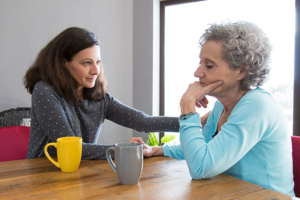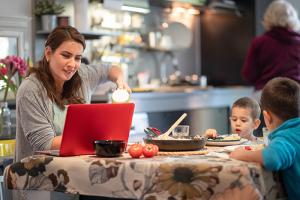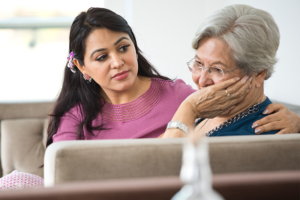How Journaling Can Be a Helpful Family Caregiving Tool

Journaling can be a helpful family caregiving tool when caring for a loved one.
A lot of us are jotting down notes all of the time: shopping lists, to-do reminders, appointments, meetings, events…the list goes on and on. If you’re a family caregiver, you have additional reasons for writing, while you manage another person’s life in addition to your own.Journaling can be a helpful family caregiving tool to keep information together in one single location. Yet we advise taking it one step further by making use of two journals for two specific purposes that are every bit as important to your role as caregiver.
The Organization Journal
This type of journal is an ideal tool for keeping everything pertaining to a senior loved one’s health and wellbeing together. Include:
- Any condition changes
- Information regarding any troubling symptoms and what might be influencing them (for example, Mom has been feeling fatigued the past few days; it seems worse on the days that she skips breakfast)
- A list of any questions you want to remember to ask the physician (along with their recommendations and answers)
- Prescriptions being taken and any possible side effects the senior may be experiencing
- Contact info for the pharmacy, health care professionals, etc.
Bring the journal with you to each doctor’s appointment so that you will have the important information you will need at your fingertips.
A Journal for Venting
Taking care of your mental health is vital to providing the best care for someone you love. A private journal just for venting your thoughts and feelings can be very helpful, as research indicates that documenting our experiences minimizes our risk for depression. This journal is exclusively for your eyes only. There’s no right or wrong approach to what or how you write, however, these suggestions can help:
- Do not censor your thoughts or concern yourself with proper grammar – just let your thoughts flow.
- Refrain from any self-judgment; the objective is just to empty the contents of your mind.
- Include drawings or doodles if you’d like.
- Write as frequently as you want, but only examine what you’ve written after a period of time has passed, allowing you the chance to gain some emotional distance from your thoughts.
- Unsure where to begin? These prompts might help.
There are several different techniques to keeping journals; choose what works best for you!
- Traditional pen-and-paper notes
- Electronic documents
- Specialized caregiving apps, for example:
Responsive Home Care’s compassionate caregivers are available to offer regular respite care services to allow you as much time as you need to spend in journal writing and any other activities you love that help restore and refresh you. Call us at (954) 486-6440 to learn more about our home care health aides in Ft Lauderdale, FL and the surrounding area.

 If you knew that a significantly better quality of life could be achieved for someone you care about, you wouldn’t hesitate to explore that option. Yet one of the most beneficial types of care – hospice care – is one that family members shy away from, because of many different hospice misconceptions.
If you knew that a significantly better quality of life could be achieved for someone you care about, you wouldn’t hesitate to explore that option. Yet one of the most beneficial types of care – hospice care – is one that family members shy away from, because of many different hospice misconceptions. If someone were providing
If someone were providing  If you were to list the top five emotions you experience in meeting the caregiving needs of your elderly parents, what would they be? Maybe you’d first think of emotions like love, compassion, and in some cases, even frustration or stress. Would
If you were to list the top five emotions you experience in meeting the caregiving needs of your elderly parents, what would they be? Maybe you’d first think of emotions like love, compassion, and in some cases, even frustration or stress. Would 






